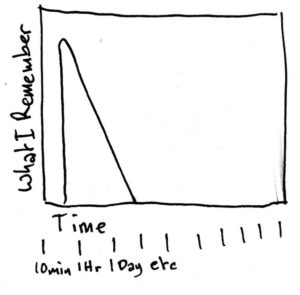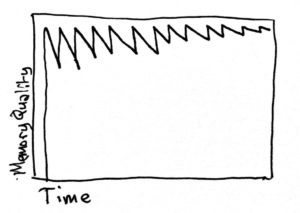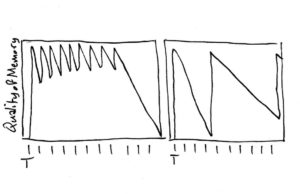Learning can be hard. One area I used to particularly struggle with is memorization. I was never very good at remembering the things I wanted to remember.
Memorization is something that people love to hate. I have heard people say things like, “I have the worst memory,” and “Rote memorization is a waste of time.”
There is some truth to this, not everything is worth remembering—and often knowing the principles of why something works is more important than memorizing every example. The problem is, there are many of times where memorization is crucial.
Which is a bummer for those of us who aren’t naturally good at memorizing stuff. But what if there was a way to turn memory into a choice, where you remember everything you decide to remember—forever?
Spaced Repetition
Think of your memory like this—you have two containers, the stuff your brain knows is important (long term memory) and everything else (short term memory). And when you use something often enough, you brain will move it from short term to long term. If you don’t use something enough, you brain decides that it isn’t important and throws away.
So how do you tell your brain that a piece of information is important?
Traditionally, if you wanted to remember something you would repeat it over and over until it stuck. This works, but it’s very time-consuming.
There is a faster way which takes advantage of how our brains work.
A useful model I have found to think about memory is this—let’s say I want to know what the German word for airplane is. I learn it, then I do nothing and hope to remember it. That looks like this:

That didn’t work. Now I know that I used to know what airplane was in German, but not what the word actually is. This doesn’t help me when I try to tell my German friends how I am going to get to Berlin.
So how’s it look if I remind myself that Airplane in German is Flugzeug, every day for a year? My memory over time would look more like this:

This drawing is a bit too simplistic, but basically, every time I remind myself that Airplane is Flugzeug, the rate of memory decay decreases. It does so slowly—much slower than my drawing shows, but at some point, I reach a point where I will never forget. The problem with this? It’s super slow and super tedious.
So how do I decrease the rate of memory decay faster? The best way I have found to do this is called Spaced Repetition. As we have already seen, every time we remember something, the speed at which we forget it, slows down. But more importantly, the closer we were to forgetting something when we’re reminded, the more the speed of decay slows down. For example:

On the left, I reminded myself of the word every hour. On the right, I reminded myself right before I was going to forget. What’s crazy, is that the rate of memory decay on the right is slower than the rate on the left. By reminding myself too often, I was slowing myself down.
Because of this—every time I remind myself, the amount of time between each reminder gets wider. So when I spaced my repetitions correctly, I remembered better, with far less energy/time invested.
Which brings up the question, how do we manage to time?
Spaced Repetition Systems
I manage my flashcards with an SRS, or spaced repetition system. The early SRS’s were physical boxes with sections with different time slots—10 min, 1 day, 3 days, 7 days, a month, 2 months, etc. When you get a flashcard right, you would move that card to the next section. This allowed people to keep track of how long they should wait before reviewing.
The only downside with an SRS is that no-one actually knows what the optimal time ranges are. But it’s possible to get close enough that it doesn’t really matter.
Enter, Anki
I use a flashcard app called Anki to manage the space between my repetitions. Anki is an SRS, and its timing between repetitions is quite good.
Physical SRS’s are great, too, but I like the convenience of an app tracking it for me.
Anki is free for Mac and Windows. The only downside is that its $25 dollars on IOS, but Anki is so useful, I think it’s well worth the price.
My Experience Using Anki
I have been using Anki for the last three years and I love it. I initially downloaded it for language learning but I have found that it is awesome for all sorts of things.
For example, when I was attending college classes I used Anki to memorize the study guide for every exam a day or two before the exam, with minimal time spent—the longest I spent was maybe three hours. I didn’t expect it to be so useful there.
Anything I want to remember long term, I use Anki for.
Most recently, I am using Anki to learn HTML, CSS, and JavaScript.
Through trial and error, I have discovered some principles for effectively remembering things in Anki.
(A Few of My) Principles for Anki—Or Any Other SRS
1. Make your own flashcards. Anki is great for helping you remember things, its not great for learning something initially. There are decks of flashcards that you can download—but in my experience, it takes way longer to memorize other people’s cards than your own.
2. Before you flip your flashcard, say the answer out loud. I have found that if you don’t, its too easy to justify a close-but-not-quite answer as right by saying “I knew that, that s what I meant.” When you give your answer out loud then flip the card, it’s much harder to cheat yourself.
3. On that note, only consider your answer right if it is right. Trust me, this one is harder than it sounds.
4. Don’t do true or false, yes or no, questions. Each question should have an answer and an explanation. Keep the cards succinct but with enough information that you can make the right connections.
5. Don’t try to cover every angle on the same card. Make multiple cards about the same thing from different angles, it will speed your learning up.
6. Likewise, reference other cards so that your brain can make connections between ideas.
7. Pretend you are teaching a class on the topic your flashcards are about. If will feel silly at first, but if you can’t explain a complex thing simply, you don’t really know it yet. Teach when you review your cards, it will help you gain a deeper understanding.
There are of course exceptions to these principles, but I find they hold true most of the time. Your experience may be different, but I have found that this is a good starting point.
Conclusion
Experiment, find what works for you. I can not recommend having a good SRS enough.
Anki is a powerful tool that can speed up your learning—particularly when used in tandem with deliberate practice and writing.
Leave a Reply